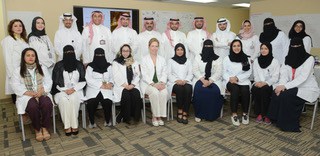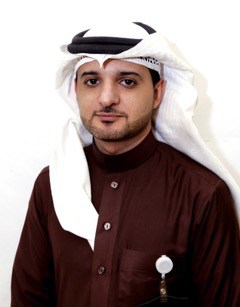Saudi Arabia is undergoing massive culture transformation and so too are the workplaces. This year I had the opportunity to visit 3 times to teach my coach training program to a group of leaders. During my time there, I had the privilege of getting to know my participants and the culture of the land which I can honestly say, made me a better person. The article below was written by Abdulrhman Al-Bahar of Riyadh, Saudi Arabia and published in the company magazine called Sanscrit. You will see me in the front row of the group picture with a smile from ear to ear. I love what I do and the people I work with.
Coaching: Making The Positive Change in The Organization
by Abdulrhman Al-Bahar
Last March I attended the initial session of a coaching program held at KFSH&RC by the Staff Development Department under Training & Development Division. Prior to the first day of the course I was asked to sign an acknowledgment letter stating that I would be fully committed to the program, which is designed for delivery over three separate phases during 2018, with each phase lasting five days.
Between phases, there is a period of one to two months where I conduct recorded coaching sessions and e-mail them to the program facilitator, who reviews them and provides me with feedback.
The first three phases were concluded over March, May and July. At the end of all phases this year, I will continue working to complete a minimum of 60 hours of coaching, including both face-to-face sessions with clients and live online sessions.
This is a big investment by the Organization, and is led by Miss Hiyam Al Talhi, Acting Head of Staff Development in the Training & Development Division and it requires a full commitment from participants. Therefore, you may be wondering, what exactly coaching is and why we need it in our organization.
What is coaching?
According to the International Coach Federation (ICF), coaching is partnering with clients in a thought-provoking and creative process that inspires them to maximize their personal and professional potential. Coaching professionals believe that all of us have great potential that we are not utilizing.
We are so busy with our everyday tasks and obligations that we fail to realize our true powers. This is where a professional coach comes in. The coach can help you increase your self- awareness and will inspire you to realize your true potential. This is done without directing you, because (believe it or not) you have the answers already; you only need to be made aware of them. Coaching is about connecting with people, inspiring them to do their best, and helping them to grow. It’s also about challenging people to come up with the answers they require on their own. Therefore, the coach doesn’t only help you solve a current problem; but also empowers you to unlock the ability to solve any similar problem in the future.
Why do we need coaching in the organization?
Coaching focuses on the individual’s untapped potentials. Therefore, a group of individuals utilizing their full potentials will result in a successful organization. By increasing employees’ engagement in their work, employees will take responsibility and be more productive, and that in turn will be reflected in the overall productivity of the organization. During a coaching session, the coach might discover those with high potential for leadership. This is very crucial for any organization, as it is always more convenient to find the next leaders from within. One other great benefit for coaching is that it identifies areas that need development. Therefore, organizations will have a better return on investment in training.
Finally, when an organization is investing in coaching, it shows that this organization is committed to invest in its employees and their career development. As a result, employees will have a stronger commitment toward the organization, increasing retention rates and gives the organization a more competitive edge in the market.
In-house coaching for King Faisal Specialist Hospital & Research Center
King Faisal Specialist Hospital & Research Center will have its own group of coaches who will establish the first Coaching Unit in the hospital. One of its significant missions is to provide their services to the staff members. As we are heading toward our 2020 transformation, coaching will be a must in realizing our employees’ best aspects and talents to meet that vision.







0 Comments